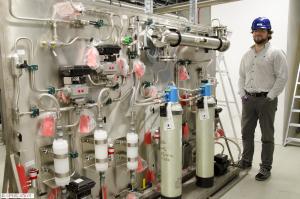Closing the tritium cycle for a cleaner, greener JET
Improvements underway at Europe's largest operating fusion research facility, JET, will reduce environmental impact and make a big saving on the site's waste management costs.
A new water detritiation system has been designed to recycle tritium used in fusion experiments, reducing the amount of radioactive waste that has to be sent to off-site disposal facilities.
Tritium is one of the two fuels expected to be used in commercial tokamak reactors and, as such, is a vital ingredient in fusion research, particularly at JET—the only device currently capable of using it.
The Culham Centre for Fusion Energy (CCFE) holds small amounts of tritium that are being added to as the research centre gears up for JET's next run of deuterium-tritium fusion experiments. As a radioactive substance, it requires extremely careful handling before, during and after operations. Any material that comes into contact with tritium has the potential to become tritiated, resulting in the possible generation of radioactive waste. Up until now, with no suitable facilities on the Culham site, dealing with that material has involved transporting it to repositories or processing plants that can handle this waste.
That is set to change as the water detriation system comes into operation.


